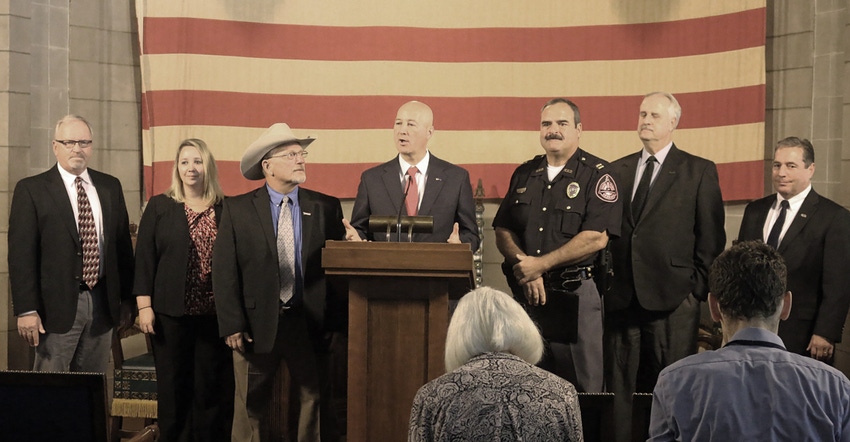
This week Nebraska Gov. Pete Ricketts, the Nebraska State Patrol, the Nebraska Department of Agriculture and various ag organizations unveiled new guidelines to keep Nebraska roads safe and keep livestock moving.
A new collaboration between NSP, NDA and Nebraska livestock organizations includes several key points designed to help livestock haulers comply with the rules of the road, while also providing a system to quickly address situations where livestock haulers are put out of service.
"If a trailer is pulled off to the side of the road because of an accident or law enforcement action, that can bring all the work on the farm to a halt," said at a press conference Oct. 15. "We also know that our tractor-trailers that are hauling livestock share the road with all of our other drivers. It's important we keep our roads safe. That's the job of the State Patrol and all our other law enforcement agencies to make sure we're looking out for the safety of all the drivers on the road."
Capt. Gerry Krolikowski, commander of NSP Carrier Enforcement, noted while the commercial trucking industry is regulated to ensure Nebraska roadways are safe, NSP understands enforcement actions that put trucks out of service can have a direct impact on livestock haulers, including the health and safety of the livestock being transported.
"When it comes to the product or the commodity being hauled being a living, breathing animal, we need to recognize the nuances that come with that, and do whatever we possibly can to make sure that the livestock aren't overly stressed," Krolikowski said.
This year, NSP, NDA and ag groups, including We Support Agriculture, began a collaboration to streamline this process.
As part of the partnership, NSP and NDA have developed a standard operating procedure (SOP) for livestock haulers to make these situations go smoothly — including preferred communication channels between the State Patrol, NDA, local resources and the livestock owner — as well as protocols to move livestock a safe location.
Krolikowski said while state troopers have always escorted vehicles, including livestock haulers, the SOP puts a formal procedure in place, and identifies safe places to take livestock for unloading, and for feed and water.
"It helps the local trooper know where's a location we can escort that vehicle to within a certain limited time," Krolikowski said.
"In the past, if somebody had been pulled over in a weigh station with cattle, it might have just been stopped there. But that's not an appropriate place to unload cattle to get them fed or watered. What you're saying is maybe there's a sale barn that's 15 minutes away, we could take them to, and that would be an appropriate place for them to be offloaded and then fed and watered," Ricketts said. "That's an example of giving the State Patrol the resources and knowledge to do that to still keep people safe, but also look out for the welfare of the animals."
The group also published best management practices for handling and transporting various kinds of livestock, and a checklist for haulers in out-of-service situations. This list is intended to assist livestock haulers in ensuring their truck and trailer are in safe, working order, and be effective when implementing the SOP.
"I'm a cattle feeder. We rely on safe and timely deliveries of our livestock, and collaborations like this positively affect our business," said Mike Drinnin, Nebraska Cattlemen president-elect.
"It's not fair to assume that I know all the facets of the law, and it's the same to assume a state trooper or someone that pulls us over understands how to move livestock," Drinnin said. "That's why we wanted to get together with the State Patrol, so we could come up with this checklist."
Each of these pieces will be incorporated into law enforcement and livestock industry training efforts.
The partnership includes the Nebraska State Patrol, Nebraska Department of Agriculture, University of Nebraska, Nebraska Farm Bureau, We Support Agriculture, Nebraska Cattlemen, Nebraska Pork Producers, Nebraska Poultry Industries, and Midwest Dairy.
For more information regarding the livestock hauling guidance, including links to the checklist and SOPs, visit We Support Ag.
About the Author(s)
You May Also Like






